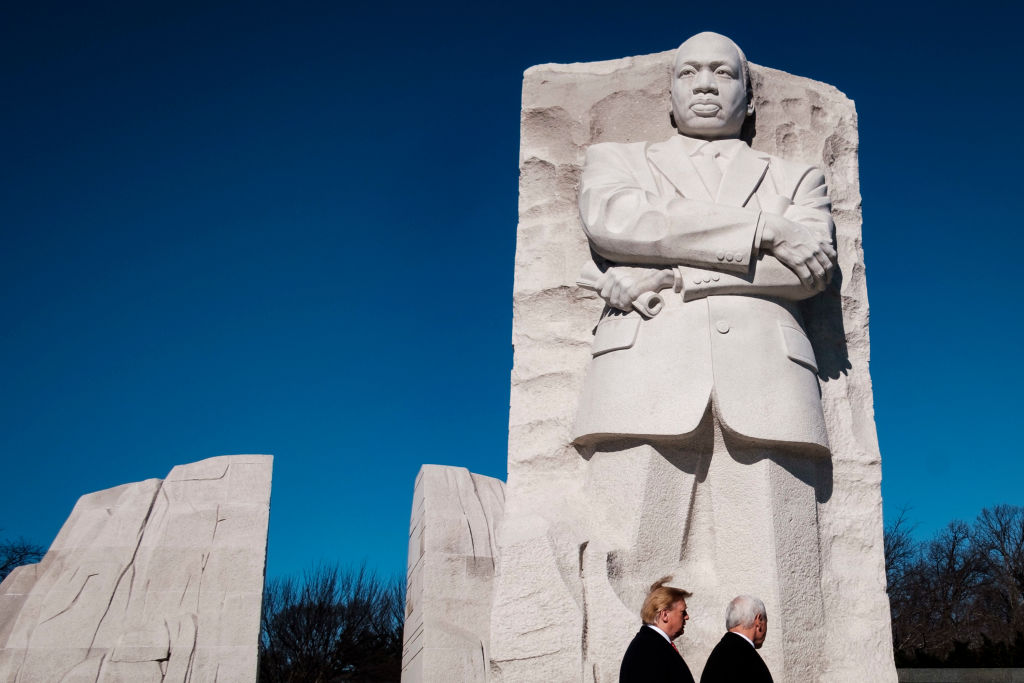-
 play_arrow
play_arrow
Foxy 106.9
-
 play_arrow
play_arrow
Dr. Candice Carter-Oliver Interview


President Donald Trump and Vice President Mike Pence visit the Martin Luther King Jr. Memorial on January 21, 2019, in Washington, D.C | Source: Pete Marovich / Getty
As the nation prepares for the inauguration of Donald J. Trump on January 20, 2025—a day that coincides with our observance of Martin Luther King Jr. Day—we are confronted with a moment of profound reckoning. This convergence compels us to ask: Who are we, and who do we aspire to be?
Democracy in America has always been imperfect, hampered by human frailty, economic inequality, and racial nationalism. Economic inequality exploits marginalized communities while consolidating power among predatory elites, creating disparities that weaken democratic participation. Meanwhile, white nationalism fosters exclusion and division, embedding bigotry, corruption and hyper-criminalization into policies and institutions that erode trust in democracy and fuel authoritarian impulses. Yet, it remains our best hope for advancing race equity and justice. Today, that hope is under attack—not only by overt forces of authoritarianism but also by subtler pressures that seek to weaken our resolve.
The anti-racist movement has long been the vanguard of democracy. From the abolition of slavery to the civil rights victories of the 1960s, and more recently the Movement for Black Lives and Indigenous-led environmental justice campaigns, these movements have transformed America’s democratic promises into reality. We are not passive observers of history; we are its authors. It is our responsibility to make democracy whole, to galvanize action, and to plant a flag that declares an unwavering commitment to justice.
A Tale of Two Americas
This inauguration day starkly reminds us of the two Americas we inhabit. On one side, we honor Dr. King’s legacy—a vision of multiracial mutual support and justice. On the other, we face a presidency that many fear will be defined by domination, division, and policies antithetical to Dr. King’s dream.
Race Forward is committed to being an anchor for those who believe in democracy and justice. Through initiatives like the Cultural Week of Action, Facing Race, HEAL Together, and our narrative work, we are building structures of resistance and transformation. This moment demands a clear and uncompromising stance: either we protect multiracial democracy, or we allow its erosion.
Authoritarianism Is Here
Let us not mince words: authoritarianism is here. Policies like Project 2025 and Trump’s cabinet appointments make clear the goal is not governance but domination—a domination that seeks to divide, dehumanize, and destroy. These are extraordinary times, demanding extraordinary responses.
Dr. King observed in his speech at Riverside Church in 1967, “We are now faced with the fact that tomorrow is today. We are confronted with the fierce urgency of now.” Silence is not an option. This urgency compels us to move beyond awareness into strategic action: safeguarding governance, resisting authoritarian policies like Project 2025, and rejecting gradualism that sacrifices the vulnerable. The moment demands bold, unified responses that match the magnitude of the threats we face. We must safeguard governance, resist authoritarian policies like Project 2025, and reject gradualism that sacrifices the most vulnerable. These steps are commitments to expanding democracy for all. Without bold action today, democracy may not survive tomorrow. We must confront this moment with a courage that matches the magnitude of the threat. Naming what we face is the first step toward resisting it.
Guarding Inclusive Governance
One of the most critical battles we face is the protection of inclusive governance—systems where government and communities work together to create and implement policies that meet the needs of all people. This model is essential to advancing racial equity, yet it is under threat from authoritarian forces.
Governance is not a luxury; it is the lifeblood of democracy. Its strength lies in tangible successes, like Seattle’s participatory budgeting initiative, which allowed marginalized communities to direct public resources toward their needs. Such efforts show how governance builds trust, fosters equity, and delivers real results in the fight for justice. Without it, we risk losing the trust and power that communities have painstakingly built.
The Dangers of Collaboration
Collaboration may come dressed in the language of pragmatism but make no mistake: it is a weapon of authoritarianism. It asks us to trade justice for access, to sacrifice the most vulnerable for proximity to power. This is not compromise; it is complicity.
Yet, we must hold space for those tempted by collaboration. Many are driven by fear—fear of losing everything, fear of instability. Our job is to empathize without endorsing, to invite them back into the fold of resilience with tangible actions that affirm our shared commitment to racial justice.
The Promise of Anti-Polarization
At the same time, we must distinguish our disdain for collaboration from our deep commitment to anti-polarization work. Building bridges within communities is not capitulation—it is essential for a healthy multiracial democracy. Critics who dismiss anti-polarization efforts as “centrism” or “appeasement” fail to recognize that such strategies foster resilience and mutual support. Their dismissal often reflects a deeper fear of shared governance, where power is distributed rather than concentrated. This distinction is essential: anti-polarization builds bridges across communities while holding firm to justice, whereas collaboration compromises principles and often empowers authoritarian structures.
Clarifying this difference between collaboration and anti-polarization ensures that we resist without alienating potential allies and instead build enduring mutual support networks. Building bridges does not mean abandoning principles; it means fortifying movements with the relationships and trust necessary to resist authoritarianism and build a democracy that works for everyone. This rhetoric often reflects fear—not of authoritarianism, but of shared power, a fear we must confront to build a democracy that truly serves everyone. Leaderful governance requires humility, trust, and the ability to embrace complexity. When we attack bridge-building as capitulation, we undermine the very solidarity we need to repel authoritarianism.
Remembering Who We Are
It is time to stop accommodating skeptics who question the value of democracy itself. Democracy is not perfect, but it is indispensable. Our role is to challenge regressive policies and stand firm in our commitment to equity. We are the heirs of multiracial democracy, and we will not abandon our mission.
We must also remember that our destinies are not predetermined. The coincidence of MLK Day and Inauguration Day is not a harbinger of doom but a profound reminder of the choice before us—to despair or to act. It is an opportunity to galvanize toward justice and to reaffirm the commitments that Dr. King championed, turning this moment into a catalyst for change. This is a call for courage and mutual support—a call for us to plant our flag and reaffirm our commitment to justice and governance that serves all communities.
The Work Ahead
Each of us has a role to play in meeting this moment with courage and purpose. Start by deepening your ties to your community or organization—this is where trust is built and collective resilience begins. Seek out multiple reliable news sources to stay informed amidst the flood of misinformation and disinformation. Finally, identify three local or state leaders advancing equity and democracy. Support them with your time, amplify their work, and help them build the coalitions needed to resist authoritarianism and foster real change.
These actions matter because they root us in truth, strengthen the democratic infrastructure, and ensure that our collective power is not diminished by fear or inaction. They are concrete ways to turn urgency into impact, to push back against despair, and to protect the multiracial democracy we are striving to build.
There is work for all of us. Grassroots organizations must continue organizing and raising awareness. Philanthropic entities must support these movements with the necessary resources. As a civil society, we must remain steadfast in our collective pursuit of justice and equity.
Fear is natural, but our response to it will shape our future. If we give in to despair, we will wither. But if we embrace mutual support and courage, we will rise.
Dr. King reminded us in his book Strength to Love, “We must accept finite disappointment, but never lose infinite hope.” Today, we are called to confront injustice, to sow seeds of equity, and to ensure that democracy flourishes in the face of adversity. This is not a time to stand idly by or wait for others to act. It is a moment to engage—to join grassroots movements, support policies that advance racial equity, and build the networks of solidarity that will protect democracy and justice for future generations.
The choice is ours. What will we do today, tomorrow, and in the months to come?
Eric K. Ward is the Executive Vice President of Race Forward and the only American recipient of the Civil Courage Prize.
SEE ALSO:
Written by: foxy1069

-
4942 Delmar Blvd.
St. Louis, MO. 63108
CONTACT US
- 314-782-FOXY (3699) OFC
- 314-944-1069 REQUEST LINE
- [email protected]
- ADVERTISING INQUIRIES
- [email protected]
FOXY QR CODE



